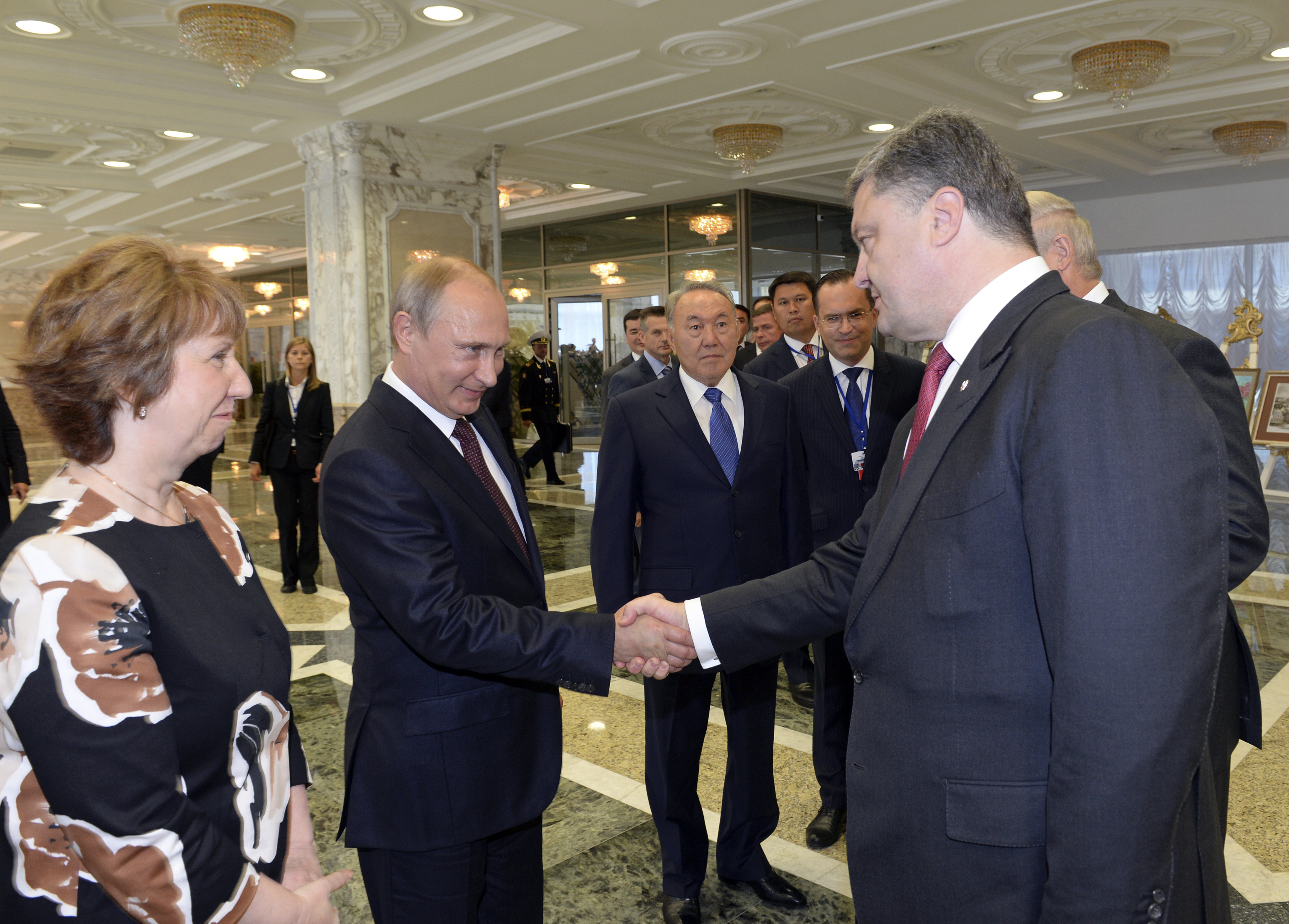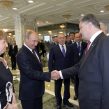
Belarus’s Peace Effort and a Likely Response of the West
Publication: Eurasia Daily Monitor Volume: 11 Issue: 153
By:

On August 26, the 3 + 1 + 1 summit devoted to the crisis in Ukraine took place in Minsk. Presidents of Ukraine, Russia, Belarus and Kazakhstan, as well as three European Commissioners attended the summit. While nobody expected a breakthrough regarding the war in Ukraine, the meeting had several positive consequences (Kyiv Post, August 26).
Most commentators believe that regardless of the outcome of the summit, its major side effect has been that Minsk has raised its status in the eyes of the West by offering a venue for the meeting that suited all the participants. No Western European capital would have suited Vladimir Putin, but Belarus has managed to retain close ties with both Russia and Ukraine. Several circumstances appear important in regard to Belarus’s peace effort.
First, never before has Belarus held a forum of this significance. Second, President Alyaksandr Lukashenka is under European Union travel sanctions. And yet, in that capacity, he played a host to EU High Representative for Foreign Affairs and Security Policy Catherine Ashton, who had been instrumental in those sanctions in the first place. As Denis Melyantsov from the Belarusian Institute for Strategic Studies put it, “it is the leader of European diplomacy, Baroness Catherine Ashton, who was now asking ostracized Lukashenka for a visa, not the other way around.” The same expert called the summit in Minsk “a triumph of Belarus’s diplomacy, foreign policy and of its president.” In the words of Yury Drakakhrust from the Belarusian Service of Radio Liberty, “formally speaking, nobody is obliged to pay for the venue for negotiations, but in practical terms, the status of a European pariah and that of a purveyor of peace in Europe are not quite compatible so one of these qualifications is going to be annulled one way or another” (Belorusskie Novosti, August 22). Third, under a condition that Belarus has become a vehicle of regional stabilization, Europe’s criticism of Minsk will probably be deemphasized. Fourth, any thaw between Belarus and the EU facilitates the preservation of Belarusian statehood, repeatedly called into question after the annexation of Crimea by Russia. Finally, the fact that, in Minsk, EU Commissioners met with leaders of the Eurasian Union (EaU) and discussed the implications of the Ukraine-EU association agreement for Ukraine’s trade exchange with the EaU effectively legitimizes that Russia-led international organization in the eyes of the West (Tut.by, August 26; Belorusskie Novosti, August 27).
On the negative side, Arseny Sivitsky, who chairs the Minsk-based Center for Strategic and Foreign Policy Research, admitted that the absence of representatives from the United States at the summit implied that “a key element of the geopolitical mosaic was missing” as “Russians had nobody to negotiate with” (Belorusy i Rynok, September 1). The same commentator claimed that the publication of the 24-step peace plan (put forth by an American-Russian group of analysts and policymakers who met in Boisto, Finland—see The Atlantic, August 26) on the day of the Minsk summit was indicative of which parties have the real capacity to bring the conflict to a peaceful resolution.
Lukashenka took it upon himself to summarize the summit’s results. He said that while everybody would crave immediate resolution of the crisis, it was impractical to expect; the basis for a dialogue should have been established first. He also praised the fact that “the very first meeting of the two most powerful [regional] integration groupings” took place and commended that tariff and non-tariff regulations of their trade exchange were analyzed. In that regard he warned that the EaU’s concerns over the association agreement between Ukraine and the EU have to be dealt with before this agreement is ratified (Tut.by, August 26).
Minsk’s slow but steady progress in its relations with Europe was confirmed in Warsaw where, on August 29, Belarus’s Foreign Minister Vladimir Makei visited his Polish counterpart, Radoslaw “Radek” Sikorski. Poland’s softened stance toward Belarus is reminiscent of the previous (2007–2010) rapprochement between Europe and Belarus, which was then promoted by Poland as well as Lithuania. Indeed, Lithuanian Foreign Minister Linas Linkevicius visited Minsk earlier this summer (See EDM July 31). Some publications in the mainstream Polish media, like those by Filip Memches (Rzeczpospolita, July 19, 2014, June 28, 2013), have long been preparing public opinion for an improvement in Polish-Belarusian relations. Memches underscores the economic success of the Lukashenka government and criticizes Warsaw for failing to take advantage of “Lukashenka’s ambitions.”
While it has become habitual to see the roots of Belarus’s success in its geopolitical maneuvering between Russia and the West and in broadening Belarus’s breathing space under Russia’s thumb (see, for example, Belorusy i Rynok, August 25), the country seems to be progressing on its own as well. Two recent developments are indicative of that: First, in 2013, Belarus’s per capita export of IT services reached $60. For comparison, in the United States, this indicator was $36, and in India, the world’s outsourcing hub, $41 (Tut.by, August 27). Second, in Petrikov (Gomel Oblast), the construction of Belarus’s second major potassium (potash) processing facility has been launched. It appears that the existing facility in Soligorsk (Minsk Oblast) has just 70 years’ worth of potassium at its disposal, so a new deposit needs to be tapped. Note that potassium and wood processing are the only major industries whose entire production cycles are controlled by Belarus itself, as most other Belarusian industries depend on raw materials and semi-finished products from Russia. From January to June 2014, Belarus exported 6.102 billion tons of potash, 24.6 percent more than during the same period in 2013 (Tut.by, August 28).
An upcoming special issue of FDI Magazine, which will be fully devoted to Belarus in anticipation of this year’s London- and New York-based investment forums, will further cast Belarus in positive light. An interview with Andrew Wrobel, a British journalist responsible for that issue (Tut.by, August 25), confirms that unless a Western visitor to Belarus is on a mission to unmask “Europe’s last dictatorship,” his/her first-hand impressions of the country are usually positive. To be sure, Belarus has yet to capitalize on those impressions and achieve a true breakthrough with its Western partners. But the current geopolitical situation may actually be conducive to this sort of outcome.




